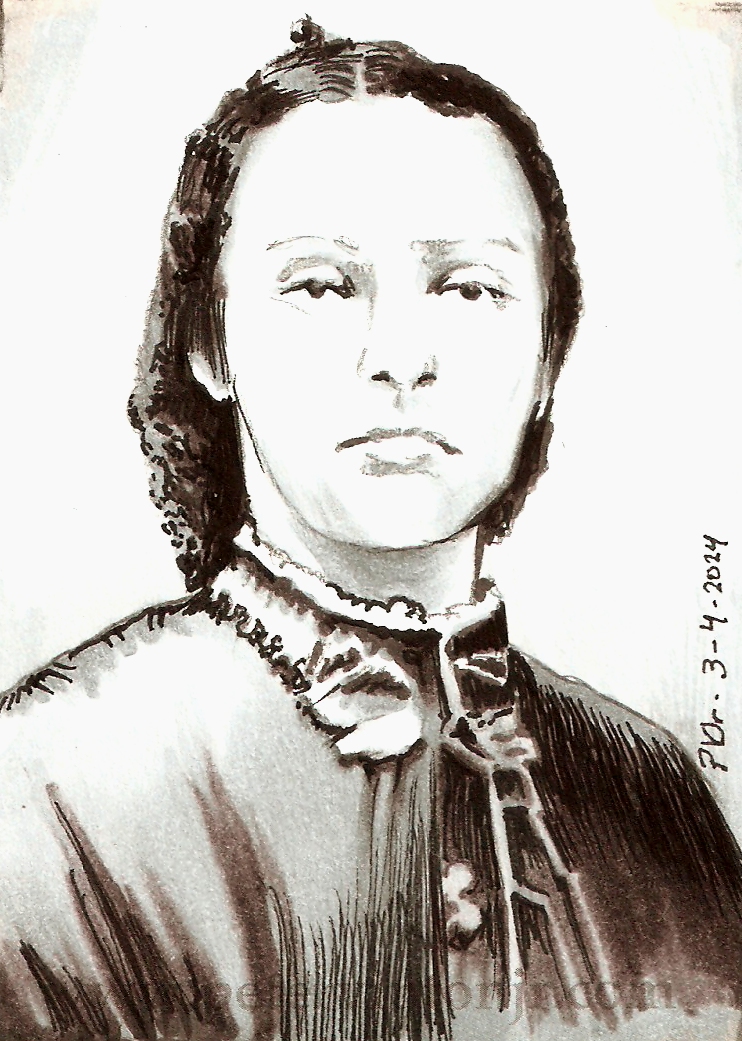Lesson 145:
Mary Jane Patterson
An ongoing illustrative history study
This piece originally posted 3/4/2024
 Officially* considered to be the first Black woman to earn a B.A., Mary Jane Patterson was born enslaved in Raleigh, North Carolina sometime in 1840, though there are few subsequent details of exactly how she and her family eventually found their way to the free state of Ohio. Enrolling at Oberlin in 1857, she disdained the then-standard 2-year program for women and instead enrolled in a full 4-year program of classical studies --the "gentlemen's course." She formally attained her Bachelor's (with high honors) in 1862.
Officially* considered to be the first Black woman to earn a B.A., Mary Jane Patterson was born enslaved in Raleigh, North Carolina sometime in 1840, though there are few subsequent details of exactly how she and her family eventually found their way to the free state of Ohio. Enrolling at Oberlin in 1857, she disdained the then-standard 2-year program for women and instead enrolled in a full 4-year program of classical studies --the "gentlemen's course." She formally attained her Bachelor's (with high honors) in 1862.
Patterson then became a teacher; first at a local school in Ohio and then moving to Philadelphia to teach at the Institute for Colored Youth. Five years later she again moved, this time to Washington, D.C., to join the faculty at the then-new Preparatory High School for Colored Youth --the first-ever public high school for Black students (and the first public high school in D.C.; today known as Paul Laurence Dunbar High School, on M Street). In 1871 Patterson was elevated to principal, but briefly stepped down to the role assistant principal for one year under Richard T. Greener (himself the first-ever Black Harvard graduate and certainly a subject of a future lesson in this series). A year later after Greener's departure, she re-assumed the principalship and stayed in that role until 1884.
Patterson made good use of her prestigious position and advocated for civil rights and women's rights --significantly she founded the Colored Women's League of Washington, D.C. She died at the relatively young age of 54, in 1894. Her home at 1532 15th St., N.W. remains, part of D.C.'s African American Heritage Trail (PDF brochure).
( * - While Patterson's fellow Oberlin alum Lucy Stanton Day Sessions is considered to be the first Black woman to graduate from a college in the U.S., Sessions' studies were in a Literary Course program that, while equivalent to a Bachelor's, could not at the time be considered a degree.)
Next page - Lesson 146: Hazel Palmer
Return to www.petervintonjr.com Main Page
 Officially* considered to be the first Black woman to earn a B.A., Mary Jane Patterson was born enslaved in Raleigh, North Carolina sometime in 1840, though there are few subsequent details of exactly how she and her family eventually found their way to the free state of Ohio. Enrolling at Oberlin in 1857, she disdained the then-standard 2-year program for women and instead enrolled in a full 4-year program of classical studies --the "gentlemen's course." She formally attained her Bachelor's (with high honors) in 1862.
Officially* considered to be the first Black woman to earn a B.A., Mary Jane Patterson was born enslaved in Raleigh, North Carolina sometime in 1840, though there are few subsequent details of exactly how she and her family eventually found their way to the free state of Ohio. Enrolling at Oberlin in 1857, she disdained the then-standard 2-year program for women and instead enrolled in a full 4-year program of classical studies --the "gentlemen's course." She formally attained her Bachelor's (with high honors) in 1862.